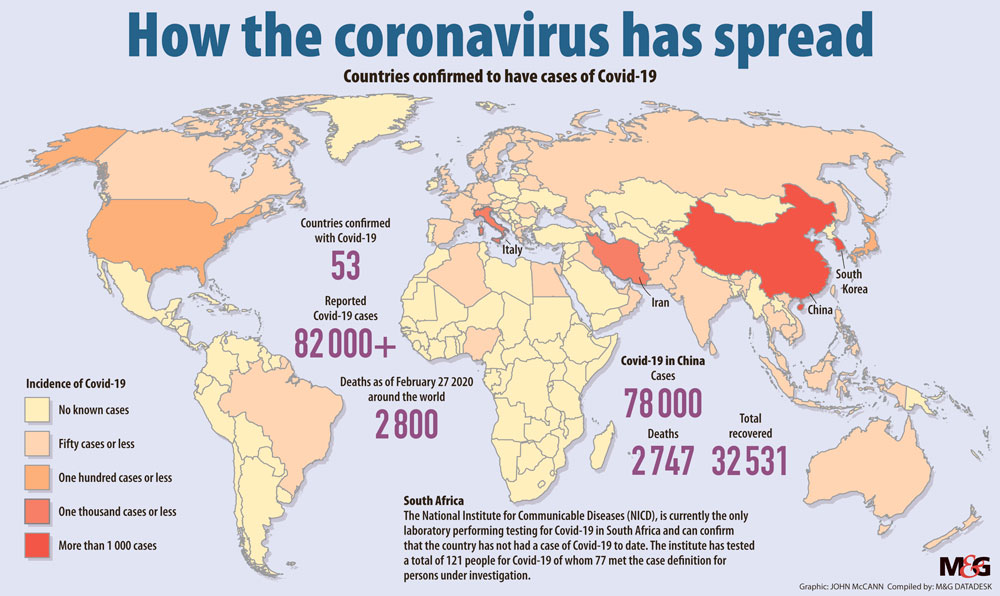The West’s perceptions of China hold up a mirror to its own preoccupations. More nuanced analysis is much-needed. (Anthony Wallace/AFP)
What is a coronavirus?
There are many different kinds of coronaviruses, according to the National Institute for Communicable Diseases (NICD). Some affect birds and mammals, including humans. In people it is usually associated with upper respiratory tract illnesses such as the common cold.
But sometimes the viruses jump from animals to humans — severe acute respiratory syndrome or SARS was thought to have come from civets; about 800 people died. The current outbreak of Covid-19 is spreading far more rapidly than SARS and killing many more people.
The name corona refers to the crown-like sugary protein “spikes” projecting above the surface when viewed under an electron microscope.
Covid-19: A few facts
On January 9, the World Health Organisation (WHO) reported that a new coronavirus had been identified in China, associated with dozens of cases of pneumonia of unknown cause in Wuhan, Hubei province. The coronavirus disease
is named Covid-19 and severe acute respiratory syndrome coronavirus 2 (SARS-CoV-2) is the name of the new virus.
Initially a majority of those affected were dealers and vendors at a seafood, poultry and live wildlife market in the Jianghan District of Wuhan city in Hubei Province. The source of the virus is not known yet.
Kerrigan McCarthy, of the NICD, said: “The virus starts with common cold or fever, sore throat, shortness of breath among other early symptoms. With early detection and proper treatment, the majority of people get better from the virus.
It is very similar to the common cold and literature written on it suggests that it has a high mortality rate.”
She added that there’s currently a low risk of infection in South Africa.
South Africa is prepared
South Africa has undertaken readiness measures to ensure detection, referral and management of cases. The department of international relations and co-operation has said that it has introduced screening and testing at all international airports for people who have travelled outside the country. There have been no confirmed cases of coronavirus in South Africa. It’s been reported that surveillance has been actively put in certain places to detect should any case occur. The NICD advises that people who develop symptoms of respiratory illness within 14 days of travel to countries where Covid-19 is known to be circulating should seek medical care.
South Africa has trained more than 1500 healthcare professionals on the Covid-19 virus.
On March 3 the NICD will host an information session for businesses, occupational health practitioners and others concerned about the disease.
How does the virus spread?
The virus is spread from person to person through respiratory droplets when an infected person coughs or sneezes. In most people the illness is mild.
The WHO advises that you wash your hands with soap; avoid
touching your eyes and nose; keep a distance of about a metre from people coughing and sneezing; sneeze into your elbow or tissue;
if you feel mildly ill, stay at home, but if you have a fever, cough and difficulty breathing, get medical help.
In most cases people who have been infected have been in close contact with people who have Covid-19, including health workers.
Stats about Covid-19
Almost 98 0000 people have been infected worldwide and more than 3300 have died thus far according to WHO as of Friday.
More than 17 000 cases have been reported outside mainland China with people from 87 countries being infected.
Since the outbreak of Covid-19 3387 medical practitioners in China — 90% of them residents of the country — contracted the virus.
Dr Li Wenliang was one of the first to raise the alarm about the virus. He died on February 7 after succumbing to the disease.
The first case of Covid-19 in Africa was reported in Egypt and the second in Algeria. Since then, Nigeria, Tunisia, Senegal and Morocco have all confirmed cases of the virus. South Africa also confirmed its first case on Thursday.
*This article is constantly being updated to reflect the latest figures. Last updated: Friday March 6 at 11 am
